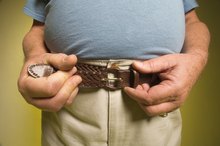How Fast Do Carbs Digest in Your Body?
Carbohydrates are the body's preferred source of energy. They are readily converted into glucose, a form of sugar, which is transported around the body to be used as energy. An excess of quickly digested carbohydrates in the diet can lead to weight gain and increased risk of adult-onset diabetes. Slowly digested carbohydrates provide the body with sustained energy to power your daily activities.
Types
Carbohydrates can be broken down into three types: simple, complex and fibrous. Simple carbohydrates include foods such as sucrose or table sugar, candy, biscuits, cakes, doughnuts, fruit juice, soda and corn syrup. Complex carbohydrates include whole-grain products such as oatmeal, brown rice, whole-grain pasta, whole-grain bread, potatoes, sweet potatoes and yams. Fibrous carbohydrates include vegetables and fruits such as broccoli, spinach, asparagus, strawberries and apples.
Complex
List of Slow-Release Carbohydrate Foods
Learn More
The speed at which carbohydrates are digested in the body depends on the molecular structure of the carbohydrate and how swiftly it is affected by digestive enzymes. Complex carbs have a complex molecular structure and digestive enzymes work on them slowly, resulting in slow, sustained absorption by the body. The process starts in the mouth where amylase in the saliva starts breaking down complex carbs into simple carbs.
Simple
The molecular structure of simple carbohydrates allows digestive enzymes to break them down swiftly so they are quickly digested and absorbed by the body. Rapid absorption of carbohydrates often provides the body with a surplus of energy. This surplus energy then adds to the body's fat stores, resulting in weight gain. Refined complex carbohydrates such as white rice, packaged breakfast cereals, white bread and pasta made of white flour are treated by the body as simple carbs and digested rapidly.
Fibrous and Soluble Fiber
Oats & Carbohydrates
Learn More
Fibrous carbohydrates pass through the body undigested. The fiber aids the body in prompt and efficient elimination of waste products. Soluble fiber found in fruits slows down digestion. Fruit juices do not contain soluble fiber and are absorbed rapidly, causing an insulin surge and sugar spike in the body.
Related Articles
Writer Bio
Ollie Odebunmi's involvement in fitness as a trainer and gym owner dates back to 1983. He published his first book on teenage fitness in December 2012. Odebunmi is a black belt in taekwondo and holds a bachelor's degree in economics from Kingston University in the United Kingdom.









